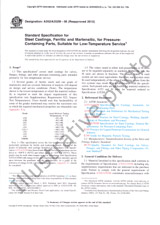We need your consent to use the individual data so that you can see information about your interests, among other things. Click "OK" to give your consent.
ASTM D6810-22
Standard Test Method for Measurement of Hindered Phenolic Antioxidant Content in Non-Zinc Turbine Oils by Linear Sweep Voltammetry
Translate name
STANDARD published on 1.7.2022
The information about the standard:
Designation standards: ASTM D6810-22
Publication date standards: 1.7.2022
SKU: NS-1069546
The number of pages: 6
Approximate weight : 18 g (0.04 lbs)
Country: American technical standard
Category: Technical standards ASTM
The category - similar standards:
Annotation of standard text ASTM D6810-22 :
Keywords:
2,6-di-tert-butyl-4methylphenol, 2,6-di-tert-butylphenol, aromatic amines, hindered phenol antioxidant, in-service oils, linear sweep voltammetry, non-zinc turbine oils, turbine oil,, ICS Number Code 75.100 (Lubricants, industrial oils and related products)
Additional information
| Significance and Use | ||||||||||||
|
5.1?The quantitative determination of hindered phenol antioxidants in a new turbine oil measures the amount of this material that has been added to the oil as protection against oxidation. Beside phenols, turbine oils can be formulated with other antioxidants such as amines which can extend the oil life. In used oil, the determination measures the amount of original (phenolic) antioxidant remaining after oxidation have reduced its initial concentration. This test method is not designed or intended to detect all of the antioxidant intermediates formed during the thermal and oxidative stressing of the oils, which are recognized as having some contribution to the remaining useful life of the used or in-service oil. Nor does it measure the overall stability of an oil, which is determined by the total contribution of all species present. Before making final judgment on the remaining useful life of the used oil, which might result in the replacement of the oil reservoir, it is advised to perform additional analytical techniques (in accordance with Practices D6224 and D4378), having the capability of measuring remaining oxidative life of the used oil. 5.1.1?This test method is applicable to non-zinc turbine oils. These are refined mineral oils containing rust and oxidation inhibitors, but not antiwear additives. This test method has not yet been established with sufficient precision for antiwear oils. 5.2?This test method is also suitable for manufacturing control and specification acceptance. 5.3?When a voltammetric analysis is obtained for a turbine oil inhibited with a typical hindered phenol antioxidant, there is an increase in the current of the produced voltammogram between 3 s to 5 s (or 0.3 V to 0.6 V applied voltage) (see Note 1) in the basic test solution (Fig. 1x-axis 1 second = 0.1 V). Hindered phenol antioxidants detected by voltammetric analysis include, but are not limited to, 2,6-di-tert-butyl-4-methylphenol; 2,6-di-tert-butylphenol and 4,4'-methylenebis(2,6-di-tert-butylphenol). Note 1:?Voltages listed with respect to reference electrode.
The voltammograms shown in Figs. 1
and 2 were obtained
with a platinum reference electrode and a voltage scan rate of 0.1
V/s.
FIG. 2?Amine and Hindered Phenols Peaks in the Basic Test Solution with Blank Response Zeroed Note 1:?5.4?For
non-zinc turbine oils containing aromatic (aryl) amine compounds
(antioxidants and corrosion inhibitors), there is an increase in
the current of the produced voltammogram between 7 s to 11 s (0.7 V
to 1.1 V applied voltage in Fig.
2) (see Note 1) which
does not interfere with the hindered phenol measurement in the
basic test solution. For the measurement of these aromatic amine
antioxidants, refer to Test Method D6971, where the neutral test solution
shall be used.
|
||||||||||||
| 1. Scope | ||||||||||||
|
1.1?This test method covers the voltammetric determination of hindered phenol antioxidants in new or in-service non-zinc turbine oils in concentrations from 0.0075 % by weight up to concentrations found in new oils by measuring the amount of current flow at a specified voltage in the produced voltammogram. 1.2?The values stated in SI units are to be regarded as standard. No other units of measurement are included in this standard. 1.3?This standard does not purport to address all of the safety concerns, if any, associated with its use. It is the responsibility of the user of this standard to establish appropriate safety, health, and environmental practices and determine the applicability of regulatory limitations prior to use. 1.4?This international standard was developed in accordance with internationally recognized principles on standardization established in the Decision on Principles for the Development of International Standards, Guides and Recommendations issued by the World Trade Organization Technical Barriers to Trade (TBT) Committee. |
||||||||||||
| 2. Referenced Documents | ||||||||||||
|
We recommend:
Technical standards updating
Do you want to make sure you use only the valid technical standards?
We can offer you a solution which will provide you a monthly overview concerning the updating of standards which you use.
Would you like to know more? Look at this page.




 Cookies
Cookies
